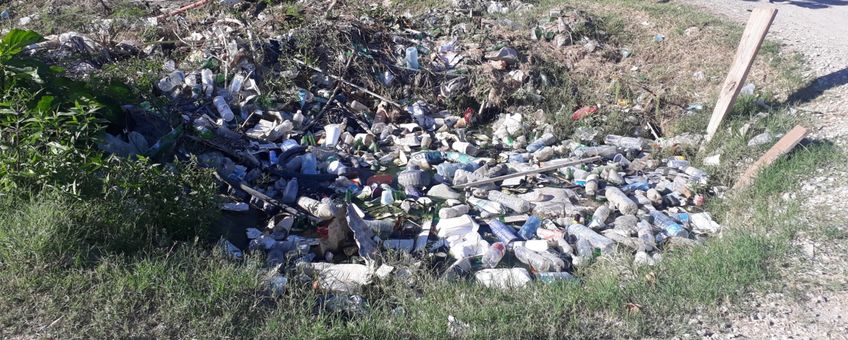
Call to action to reduce plastic pollution on St. Maarten
Dutch Caribbean Nature Alliance (DCNA), Nature Foundation St MaartenNature Foundation St. Maarten is urging residents and businesses to abandon the use of single-use, non-biodegradable plastics such as straws, plastic bags and polystyrene foam containers in a bid to reduce the crippling plastic pollution on the island. The foundation launched the 'Reduce and Reuse project' in April 2018 to educate and encourage residents and businesses 'to reduce their waste output and start using biodegradable and reusable products instead of single-use plastics'.
The project was launched with the release of five easy steps businesses and residents can take to reduce their single-use plastic pollution. Several initiatives have also been launched in the rest of the Dutch Caribbean in an effort to reduce the amount of trash in fragile natural areas. On Aruba, single-use plastic bags have been banned since 2017, and the ban will include all single-use plastics by 2020. Many waste clean-up initiatives are happening on the islands, such as the 'One Hour Clean-up Power project' and 'Dive Fiends’ Quarterly Underwater Clean up' on Bonaire.

St. Maarten has a considerable waste production and management problem. The island has the highest municipal solid waste of the Caribbean at 9.7 kilogram per capita per day, compared to Curaçao’s waste generation of 0.44 kilogram. According to Nature Foundation, St. Maarten uses more than 1.4 billion plastic straws a year, and the use of Styrofoam, plastic cups and cutlery and plastic bags is widespread and accepted. The island cannot deal with the creation of so much waste. The landfill was declared at full capacity in 2008 but is still being used and toxic landfill fires occur frequently. Garbage bins, when available, are overflowing and beaches and roadsides are littered with solid waste. For an island whose economy depends on the health and beauty of its natural resources, this is a substantial problem. A 2017 study estimated that $8 million in tourism revenue could be lost each year for every 15 items of beach litter/m2. Public health is also threatened by water and soil contamination.
A central goal of the Reduce and Reuse project is to instigate a drastic change in attitude and behavior towards waste as littering is widely accepted on St. Maarten. Residents and business owners must learn how to properly manage the waste they create, for example through recycling, while also trying to reduce it as much as possible. “Biodegradable products such as paper straws, paper plates, biodegradable cups/food containers, wooden utensils are already available on the island”, explains Nature Foundation’s Project Officer coordinator Melanie Meijer zu Schlochtern, “What we need is for people to understand why using these instead of plastic products is vital for their health, lifestyle and future”. Nature Foundation is actively promoting the use of reusable and biodegradable products in the community, by means of social media, newspaper articles, flyers, establishment visits, workshops and school presentations. A number of bars and restaurants on the island have embraced this much needed change and are now plastic-free or taking steps to reduce their use of single-use plastic. The Foundation is also lobbying for an island wide ban on single-use plastics as such a ban will help to significantly decrease the widespread use of plastic products.
Plastic pollution has emerged as one of the most significant environmental crises of our time. It is estimated that 9 million tons of plastic enters our oceans every year, and that by 2050 there will be more trash than fish. The Caribbean Sea has one of the highest levels of plastic concentrations in the world, and the World Bank predicts that by 2025, 790,000 tons of plastic waste per year will enter this already fragile sea. Most marine life is threatened by plastic pollution mostly affected through entanglement and ingestion of plastic litter.
Fortunately, in a region that is so dependent on the health of its natural resources, there has been a clear shift in attitude towards single-use plastic. Since Haiti first banned the use, sale and production of single-use plastics in 2012, six other Caribbean countries (Jamaica, Dominica, the Turks and Caicos, Haiti, St. Vincent and the Grenadines, Antigua and Barbuda) have joined the fight against plastic by banning the importation, sale and manufacture of single-use plastic products. The Bahamas, Barbados, Belize and Anguilla have all pledged to introduce such a ban by 2020. The United Nation’s Clean Seas Campaign, whose goal is to drastically reduce the consumption of single-use plastics and eradicate the use of microbeads, has already received the support of 15 countries in Caribbean and Latin America.
Text: Florence Depondt, Tineke van Bussel, DCNA
Pictures: Melanie Meijer zu Schlochtern, Nature Foundation St. Maarten; Tadzio Bervoets
